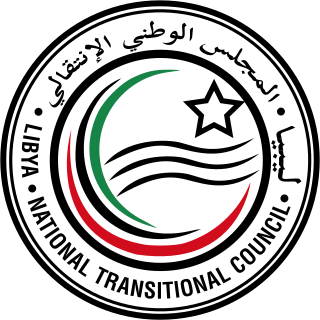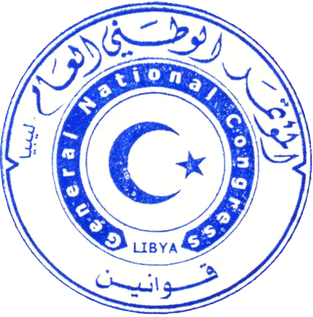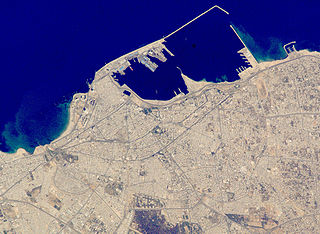Related Research Articles

Tripoli International Airport is a closed international airport built to serve Tripoli, the capital city of Libya. The airport is located in the area of Qasr bin Ghashir, 24 kilometres (15 mi) from central Tripoli. It used to be the hub for Libyan Airlines, Afriqiyah Airways, and Buraq Air.

The aftermath of the First Libyan Civil War has been characterized by marked change in the social and political order of Libya after the overthrow and killing of Muammar Gaddafi in the civil war that was fought in Libya in 2011. The country has been subject to ongoing proliferation of weapons, Islamic insurgencies, sectarian violence, and lawlessness, with spillovers affecting neighboring countries including Mali.
The Libyan Armed Forces or the Libyan Arab Armed Forces are, in principle, the state organisation responsible for the military defence of Libya, including ground, air and naval forces.

The Libyan Army is the brand for a number of separate military forces in Libya, which were under the command of the internationally recognised Government of National Accord (GNA).

The Libyan National Army or the Libyan National Arab Army is a component of Libya's military forces which were nominally a unified national force under the command of Field Marshal Khalifa Haftar when he was nominated to the role on 2 March 2015 by the House of Representatives, consisting at the time of a ground force, an air force and a navy.

The General National Congress or General National Council was the legislative authority of Libya for two years following the end of the First Libyan Civil War. It was elected by popular vote on 7 July 2012, and took power from the National Transitional Council on 8 August.

The Second Libyan Civil War was a multilateral civil war that lasted from 2014 to 2020 in the North African country of Libya fought between different armed groups, mainly the House of Representatives (HoR) and the Government of National Accord.

The National Salvation Government was a government body formed by politicians from the General National Congress's blocs that lost the June 2014 elections in Libya. The NSG was led by Khalifa al-Ghawil. The term Libya Dawn Coalition was used to refer to the armed groups and the wider political movement supporting the NSG. The NSG was one of the major sides in the Second Libyan Civil War from its formation August 2014 until its dissolution in April 2016.

The Libyan Crisis refers to the current humanitarian crisis and political-military instability occurring in Libya, beginning with the Arab Spring protests of 2011, which led to a civil war, foreign military intervention, and the ousting and death of Muammar Gaddafi. The civil war's aftermath and proliferation of armed groups led to violence and instability across the country, which erupted into renewed civil war in 2014. The crisis in Libya has resulted in tens of thousands of casualties since the onset of violence in early 2011. During both civil wars, the output of Libya's economically crucial oil industry collapsed to a small fraction of its usual level, with most facilities blockaded or damaged by rival groups, despite having the largest oil reserves of any African country. On October 23, 2020, parties signed a permanent ceasefire.
Khalifa al-Ghawil, sometimes transliterated as Khalifa al-Ghweil or Ghwell, is a Libyan politician. He was the prime minister of the General National Congress-led National Salvation Government in Tripoli.

Fayez Mustafa al-Sarraj is a Libyan politician who served as the Chairman of the Presidential Council of Libya and Head of Government of the Government of National Accord from 2016 to 2021, which was formed on 17 December 2015 under the Libyan Political Agreement. He has been a member of the Parliament of Tripoli.

The Government of National Accord was an interim government for Libya that was formed under the terms of the Libyan Political Agreement, a United Nations–led initiative, signed on 17 December 2015. The agreement was unanimously endorsed by the United Nations Security Council, which welcomed the formation of a Presidency Council for Libya and recognized the Government of National Accord as the sole legitimate executive authority in Libya. On 31 December 2015, Chairman of the Libyan House of Representatives, Aguila Saleh Issa declared his support for the Libyan Political Agreement. The General National Congress has criticized the GNA on multiple fronts as biased in favor of its rival parliament the House of Representatives.
This is a detailed timeline of the Second Libyan Civil War which lasted from 2014 to 2020.
Clashes occurred in western Libya since 14 October 2016, when a coup d'état attempt was conducted by the former head of the National Salvation Government (GNS), Khalifa al-Ghawil, against Prime Minister Fayez al-Sarraj, the head of Libya's Government of National Accord (GNA). This evolved into fighting between the GNA and GNS for control of Tripoli and parts of western Libya, while pro-GNA militias also attacked other militias for control of the region.

The Battle of Tripoli was a series of clashes in Tripoli, Libya from 27 August to 25 September 2018 during the Second Libyan Civil War. It was fought between several militias and was ended by a ceasefire.

In late January 2019, the Libyan National Army (LNA) led by Marshal Khalifa Haftar launched an offensive to take control of the city of Sabha and the rest of southern Libya from the internationally recognised Government of National Accord (GNA) and local factions. Officially, the LNA announced that the reason for the operation was to remove terrorists, Chadian rebel groups, and to secure the border, but it has expanded Haftar's territorial control and acquired him oil fields near Sabha. It has also restarted some interethnic conflicts as the LNA has allied with local Arab tribes, while the Tuareg and Toubou tribal militias are loyal to the GNA.

The Western Libya campaign was a military campaign initiated on 4 April 2019 by the Operation Flood of Dignity of the Libyan National Army, which represents the Libyan House of Representatives, to capture the western region of Libya and eventually the capital Tripoli held by the United Nations Security Council-recognised Government of National Accord. The Government of National Accord regained control over all of Tripoli in June 2020 and the LNA forces withdrew from the capital, after fourteen months of fighting.

Fathi Ali Abdul Salam Bashagha, known simply as "Fathi Bashagha" or occasionally Fathi Ali Pasha, is a Libyan politician and the interim prime minister of Government of National Stability. He served as Minister of Interior from 2018 to 2021.
This is the order of battle for the Western Libya campaign, codenamed "Operation Flood of Dignity" by forces under Field Marshal Khalifa Haftar. The forces supporting Haftar and the House of Representatives, mainly the Libyan National Army, are opposed by the armed forces of the forces loyal to the Government of National Accord, including the Libyan Army and the Tripoli Protection Force.

The Central Libya offensive, officially known as Operation Paths to Victory, was a military offensive in Libya launched by the forces of the Government of National Accord, to take the city of Sirte and Al Jufra Airbase from the House of Representatives backed by the Libyan National Army. The city of Sirte is considered strategically important because of its close position to oil facilities, which give it control over Libya's oil and gas shipping ports. The Al Jufra Airbase is strategically important for the GNA, due to its central position to Fezzan and denying the Libyan National Army air superiority over Central Libya.
References
- ↑ New Interior Minister takes office. Libya Observer. Published 20 February 2018. Retrieved 9 April 2019.
- ↑ Libyan PM sacks interior minister due to health condition. Xinhua. Published 16 February 2018. Retrieved 9 April 2019.
- ↑ Libyan PM reshuffles ministers to broaden support after Tripoli clashes. Reuters. Published 7 October 2018. Retrieved 9 April 2019.